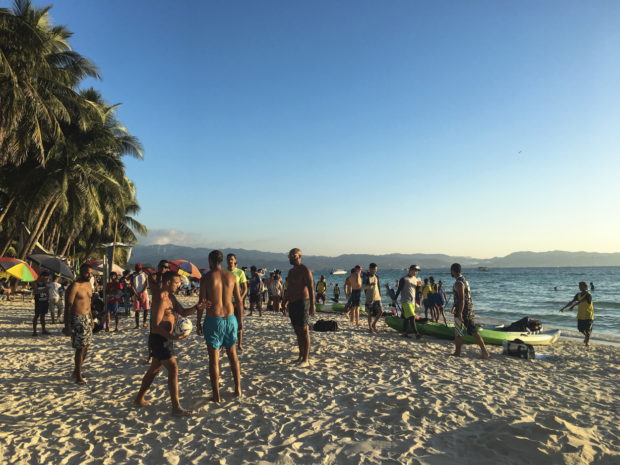
SUNSET IN BORACAY Foreign and local tourists enjoy the sunset in Boracay despite reports of
persistent environmental problems on the country’s top resort island. —SHERWIN VARDELEON
ILOILO CITY – Business operators on Boracay Island are appealing to the Department of Environment and Natural Resources (DENR) to ensure that their list of establishments allegedly violating environmental laws and regulations is validated and up to date before it is made public.
“We have not seen the list but several establishments that were reportedly on the list are already compliant. One of those is not operating anymore,” Nenette Aguirre-Graf, president of the Boracay Foundation Inc., told the INQUIRER.
DENR Undersecretary Jonas Leones, the agency’s spokesperson, said that out of 51 establishments that were issued notices of violation for non-compliance or violation of provisions of the Clean Water Act, 14 were found to be compliant.
The violations are mostly illegal connections to the drainage system or not being connected to the island’s sewerage system. The DENR is targeting establishments that illegally dump sewage water to the drainage system which is intended only for rainwater.
Graf said that while business owners have declared their support for the crackdown against violators of environmental laws and regulations on the island, the issuance of notices of violation should be based on verified information as not to damage the image of compliant establishments.
Leones assured that the due process would be followed and that the alleged violators would be given an opportunity to respond and correct any violation or non-compliance.
“There will be no immediate closure of any establishment,” he told the INQUIRER.
Aside from those violating the Clean Air Act, the DENR is also issuing show cause orders to 842 establishments and other structures allegedly situated in areas classified as timberland.
The structures are on about 400 hectares of timberland and are not covered by titles issued by a court or by Special Land Use Permits (SPLUP) and Forest Land Use Agreement for Tourism Purposes (FLAgT).
Presidential Proclamation (PP) 1064 issued by then President Gloria Macapagal-Arroyo on May 22, 2006, categorized 628.96 hectares or 60.94 percent of the island as alienable and disposable, and the rest as forest land and protected areas.
Only about a third of the island (292 hectares), belonging to the heirs of Ciriaco Tirol, are titled, according to the DENR.
Leones said the agency was planning to tap DENR personnel from other regions to augment its personnel in Boracay to hasten the serving and processing of notices of violation and show cause orders.
“We plan to deploy teams to speed up the process,” he said.
While business establishments can apply for a FLAgT to legalize the structures on timberland areas, this will still not be automatically approved.
“It’s the risk that [owners and investors] took when they put up their properties [in timberland areas],” Leones said when asked if hotels and resorts in timberland areas would still be removed considering the investments involved.
“We are mindful of the carrying capacity of the island. Can it still absorb more people and garbage,” Leones said.
A FLAgT allows the temporary use, occupation and development of any forest land for tourism purposes for a period of 25 years renewable for another 25 years. The agreement covers forest lands to be used for bathing, camp sites, ecotourism destinations, hotel sites and other tourism purposes.
President Duterte has issued a six-month deadline for government agencies, local government units and business operators to address Boracay’s environmental problems.
He has called the popular tourist destination a “cesspool” and “full of shit” and threatened to close down the 1,032-hectare island which has drawn protests from several residents and business owners.

